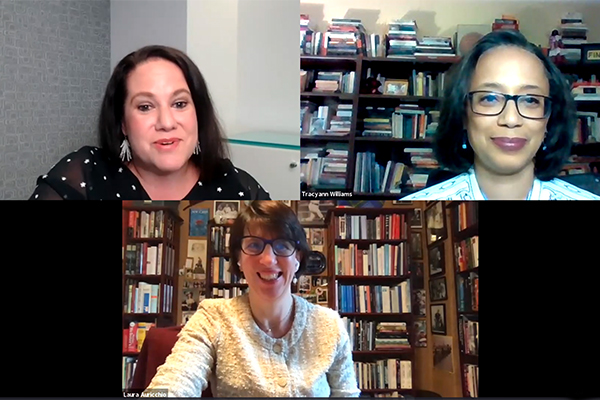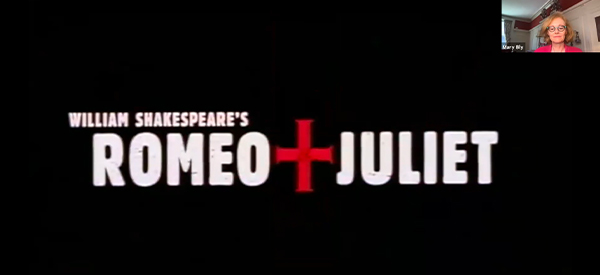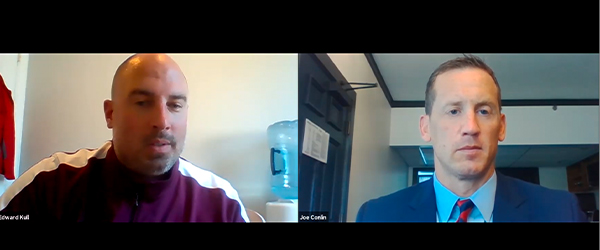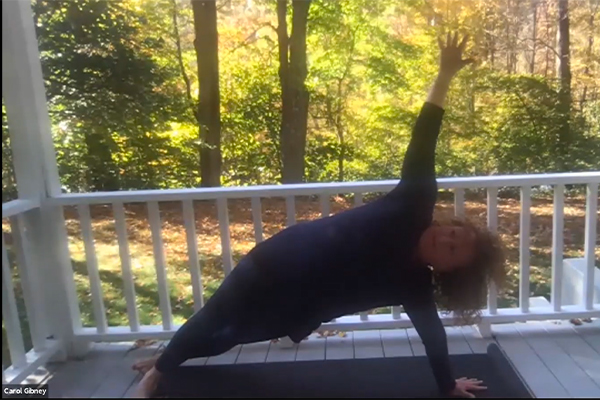“That richness of thought and perspectives really helps our work,” said Jonathan Valenti, FCLC ’98, a principal in the customer and marketing strategy practice at Deloitte.
Valenti, who majored in information science, was one of three Fordham College at Lincoln Center (FCLC) grads who participated in a Feb. 9 virtual panel titled “From FCLC to the World of Business.”
Tracyann Williams, Ph.D., assistant dean for student support and success at FCLC, moderated the discussion. She asked the panelists to share their experiences as Lincoln Center students, their tips on taking liberal arts skills into the job market, and what they like about hiring applicants with that background.
Maureen Beshar, FCLC ’86, majored in philosophy and political science, and today she is executive director of business development for the investment management firm Hardman Johnston Global Advisors. She said her Fordham Jesuit education—with its focus on well-rounded learning and being a person for others—has been valuable in her personal and professional life.
“Fordham’s [Jesuit] foundation … I really think it makes a difference in a person,” said Beshar, whose two daughters both attend Fordham and who serves on the University’s President’s Council, a group of successful alumni committed to mentoring Fordham’s future leaders, funding key initiatives, and raising the University’s profile. “It really, ethically, helped me think differently. I can attribute a lot back to Fordham, with how I treat others, how I think about situations.”
Make the Most of ‘Internship City’
Scot Hoffman, FCLC ’98, majored in English and assumed he would pursue a career in academia. But a public affairs internship at the Fresh Air Fund, which Hoffman found through Fordham’s Career Center, resulted in him becoming the organization’s director of public affairs after he graduated. He has worked in the public affairs and corporate communications field ever since, specializing in building and managing corporate reputation. Today, he is vice president and director of communications at the San Francisco-based investment firm Dodge & Cox.
“Internships are really, really important,” Hoffman told students, adding that Fordham’s location is helpful in getting that experience. “Explore what’s available to you. New York City is one of the greatest cities in the world. So many industries are represented there, [and there are]so many opportunities there.”
Blending Business Education with the Liberal Arts
The alumni panelists were joined by Robert Daly, assistant dean of the Gabelli School of Business at Lincoln Center, who discussed the opportunities for FCLC students to study things like marketing, business administration, and sustainable business by taking classes or minoring at Gabelli. He also emphasized that Gabelli undergraduates complete a liberal arts core, an example of Fordham’s faith in the value of a liberal arts education, and that he often encourages Gabelli students to consider FCLC minors like psychology to complement their business majors.
Williams said that the panelists’ perspectives were “invaluable” in helping students “understand how you may move from the liberal arts into business—that it is not necessarily a linear path, but one that is exciting.”
]]>Organized by Marisa Villani, senior assistant dean for undergraduate studies at the Gabelli School of Business; Tracyann F. Williams, Ph.D., assistant dean for student support and success at Fordham College at Lincoln Center; and Christie-Belle Garcia, Ph.D., assistant dean for student support and success at Fordham College at Rose Hill, the event included more than a dozen graduating seniors from Fordham’s new First Gen Network.
Seniors Leslie Ann Abreu and Qi Di Zhang kicked off the ceremony with a heartfelt thank-you to attendees—“the people who have formed networks of support for first-generation graduating students”—before introducing keynote speaker Adrienne Boykin, a 2009 Gabelli graduate and a member of Fordham’s Multicultural Organization Supporting Alumni Initiatives and Community (MOSAIC) affinity chapter.
“This is truly a moment to celebrate for both you and your families because we know, as first-generation college students, we are not only celebrating for ourselves, but we’re also celebrating on behalf of our families and our communities,” Boykin said.
Words of Wisdom from a Fordham Grad
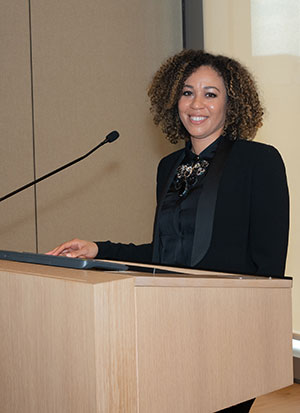
After studying accounting at Fordham, Boykin earned an M.B.A. from Mount Saint Mary College. In 2014, she “came full circle” when she joined America Needs You, a nonprofit offering mentoring and career development support to first-generation college students. She’s currently the organization’s chief financial officer.
Boykin encouraged graduating seniors to celebrate their achievement and take a minute to reflect on their college journey, especially times when they may have felt impostor syndrome.
“With the support of your family, your friends, and the Fordham community, you remembered that you actually earned your spot at Fordham, that you belong, and that you are paving the way for not only yourself but for future generations to go to college and to graduate,” she said. “The perseverance and strength that you have [shown] all of these years led you to today.”
Boykin imparted three tidbits of wisdom: “Impostor syndrome will continue to present itself in your life; however, you can and will get through it. Mentorship matters. And keep an open mind during life’s journey.”
Following Boykin’s address, each student’s name was called, and they received a commemorative pin. The ceremony also included a champagne toast.
A Supportive Alumni Community
A handful of alumni were also in attendance. As first-generation grads themselves, they offered advice and shared tips they’ve picked up in the years since they graduated from Fordham.
Marcella T. Barry, FCRH ’92, GSE ’96, vice chair of the President’s Council— a group of successful professionals and philanthropists committed to mentoring Fordham’s future leaders—encouraged students to stay connected to Fordham after graduating, and to “wave their first-gen flag” whenever possible.
“You do belong here because you worked really hard,” said Barry, the chief people officer at Jitjatjo, a staffing marketplace and workforce management platform. “Embrace it, and don’t hide it. Talk about it. It defines who you are, and in life, it’s those stories that are really important to tell.”
Jason Caldwell, GABELLI ’10, ’17, GSAS ’11, a vice president at Goldman Sachs and another President’s Council member, had an informal chat with the soon-to-be graduates during the reception. He gave them his contact info—and urged them to use it.
“Because Fordham has been so generous to me, I feel like it’s my duty to do the same,” he said, sharing that every position he’s held since graduating has been due to his Fordham connections.
“If someone ever tells you that they’re willing to help you and to give them a call or reach out, take them up on it,” Caldwell said. “That’s the only way that you can get ahead and move forward more easily.”
A Family Role Model and Future Educator

Abreu, a psychology major whose family migrated to the Bronx from the Dominican Republic when she was 13, said she takes pride in being the first college graduate in her family, and in serving as a role model for her little sister and her whole family.
She’s enrolled in the Accelerated Master’s in Teaching Program at Fordham’s Graduate School of Education. After earning her bachelor’s degree this month, she’ll continue working toward a master’s degree specializing in bilingual childhood education.
More than providing her with an education, Fordham has helped Abreu come out of her shell. “When I first came over here, I thought I’d be able to manage without socializing,” she said. “I used to be very introverted, very closed off. It’s been a transitional four years. I was not expecting that I’d be able to really step out of my comfort zone and express all my ideas and perspectives.”
Keeping Your Options Open
Chantz Kouveras said that although his parents made clear their desire for him to attend college, he wasn’t always sold, instead contemplating some career paths that didn’t require a college degree. But ultimately, he was swayed.
“I wasn’t necessarily seeing the opportunities that college would open up,” said Kouveras, who will earn a bachelor’s degree in political science and classical civilization, and will serve in the National Guard after graduation. “Looking back, I’m grateful because when you’re 18, you have no clue how many doors you’re going to be closing to yourself if you don’t take certain opportunities.”
One of the most surprising things about college, Kouveras said, was how much he had to figure out for himself, such as housing registration; luckily his friends and the Fordham community helped him navigate it all.
“There’s a lot that’s just kind of left to you,” he said. “To me, that’s just the college experience: figuring what you have to figure out on your own and building a network to help you out with that stuff.”
Preparing for a Career, Not Just a Job
Qi Di Zhang, a Long Island native who studied business administration with concentrations in marketing and consulting and a minor in economics, credits Fordham with teaching her balance.
“Being first-gen, I had to figure out how to balance schoolwork, getting a job, socializing, and having time to take care of myself,” she said.
Growing up, Zhang said that attending college was considered “a no-brainer” in her home. Her parents “came to America with the notion that you’re here to have better opportunities, and the first step of that is to get a better education.”
“My mom didn’t finish middle school, and my dad didn’t finish high school. My parents have jobs,” she said, “but they want me to have a career.”
Founded by students last fall, the First Gen Network connects and supports students who are the first in their families to pursue college degrees. Allies of first-generation graduates are welcome.
]]>
Photo by Patrick VerelSana Toor’s ideal route to a career in neuroscience passes through medical school.
But to get there, Toor, a first-year student at Fordham College at Lincoln Center, needs to master calculus. So, when she realized in January that she needed a little help this semester, she turned to an app on her smartphone that was unveiled to Fordham undergraduates this fall.
The app is similar to those that allow customers to summon a ride with Uber or Lyft. Students seeking a tutor for a class they’re taking put in a request for a specific time and place, and if a student tutor who has completed the class finds that the request fits their schedule, they accept the request.
Any student can become a tutor provided they have received at least a B+ in that class and have been trained on how to instruct others. Tutors are paid $15 an hour with funds from the offices of the deans of the Fordham College at Rose Hill and Fordham College at Lincoln Center. (The app will be available to Gabelli School students in September.)
Toor, a native from Farmington, Connecticut, heard about the app from one of her professors, and after downloading it to her phone and putting in a request, she met with Arina Medvedeva, a sophomore majoring in neuroscience and visual arts. The two have met for both in-person and Zoom meetings eight times this semester, including a two-hour cram session before her midterms.
“She’s amazing. … I’m doing a lot better than I would have without a tutor,” she said.
Quick, Easy, and Free
Toor said she’s found it helpful to work primarily with Medvedeva but has also used the app to book other tutors.
“I’ve had SAT tutoring before, and for one session, I felt like I didn’t learn anything, and it was also so much money for an hour,” she said.
But the fact that I can just send out a request and in five minutes, I’ll get a tutor, and Fordham will pay for it? I think that’s amazing. I’m glad I’m taking advantage of it.”
Earning Money on Their Own Schedule
Medvedeva is also a fan. This semester, she has been tutoring three other students in Applied Calculus on Friday afternoons and evenings, and one more with whom she meets occasionally to review statistics. In addition to working 10 hours a week on campus as part of work-study, Medvedeva, a commuter student who lives near the Lincoln Center campus, tutors for at least five hours a week.
“I love helping people, and I think I have a talent for explaining things,” she said.
“It’s also an opportunity to refresh my memory. Right now, I’m taking chemistry, and there’s a lot of math. I understand better what’s going on because I’m also tutoring.”
Charlotta Lebedenko, a senior at Fordham College at Rose Hill majoring in chemistry and philosophy, has responded to requests on the app for tutoring in organic chemistry and biochemistry.
“What I like about it is … we get to choose what and when we want to tutor, so I know I’m always going to be prepared for the sessions,” she said.
“The app is nice, I like how it’s formatted, the payments come in super quickly. The online virtual platform is really nice.”
A Flexible, Peer-to-Peer Model
The move to an app-based tutoring system was spearheaded by Tracyann Williams, Ph.D., assistant dean for student support and success at Fordham College at Lincoln Center, and Christie-Belle Garcia, Ph.D., former assistant dean for student support and success at Fordham College at Rose Hill.
Williams said the program, which both she and Garcia discovered independently, is not meant to replace all tutoring happening at Fordham, but to augment it. It’s an example of the University being flexible in how it offers services to students.
“If we have other tutoring systems and resources, that’s awesome, because that means we’re serving students on multiple levels and multiple capacities. That’s a very exciting prospect,” she said.
“I’m very interested in this peer-to-peer model because students get experience working with each other and building connections with each other. They’re building cross-campus connections at a time when students are suffering and are saying it’s hard to meet people.”
There are currently 180 courses that are covered through the system. Math is the most popular, along with other STEM disciplines and philosophy. A handful of departments have not opted in, but most have, said Williams.
Maura Mast, Ph.D., dean of Fordham College at Rose Hill, said that in the summer of 2020, the college piloted online tutoring for summer courses, and expanded them in the next academic year. That experience led her to consider this system.
“Tutoring needs to be supported with strong training and oversight. This offers all of this, plus the flexibility for students to arrange for tutoring when and where it works best for them,” she said.
“I’m delighted with the strong growth in utilization over the past six months.”
Laura Auricchio, Ph.D., the dean of Fordham College at Lincoln Center, called the app a “game-changer.”
“Instead of expecting students to work around schedules set by the university, it allows them to decide when, where, how, and with whom they want to learn. It’s an important step in our collective efforts to rethink our systems and structures with an eye to ensuring that student needs are always at the center of our policies and practices,” she said.
]]>A QR code in a plastic holder sat in a prominent position on their table; visitors who scanned it were directed to an Instagram account for their group.
Their goal? Recruit Fordham students, faculty, and administrators to join First Gen Network, a group formed this semester to support students who are the first in their families to attend college. Since 2017, Nov. 8 has been celebrated as National First Generation Day.
“When I had to choose a college, it was during the pandemic, and it was so difficult because my parents didn’t really know much. It was a daunting process—picking schedules, learning about loans, and things like that,” said Stegmuller, a second-year Fordham College at Lincoln Center student.
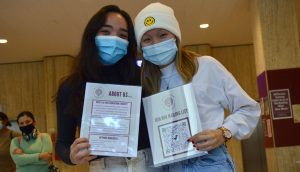
The tabling event, which was also held at Rose Hill, was part of a kickoff for the group, which was convened in September by Tracyann Williams, Christie-Belle Garcia, and Marisa Villani, the assistant deans for student support and success at Fordham College at Lincoln Center, Fordham College at Rose Hill, and the Gabelli School of Business, respectively.
Stegmuller and Chen, a senior at the Gabelli School of Business, said they were attracted to the group, which is planning to hold a panel discussion in the spring because it offered connections to members of the community who they otherwise would never meet. Neither knew each other before joining the group.
Stegmuller said one of the things she’s come to appreciate is how many first-generation students have to overcome an inclination to do everything themselves.
“We’re just so used to doing everything on our own, so it’s good to have a group where we can reach out and learn to ask for help. When people are like ‘Oh, just go to office hours, or ask the dean for help,’ to us, it’s like, ‘No, I can do that myself,’” she said.
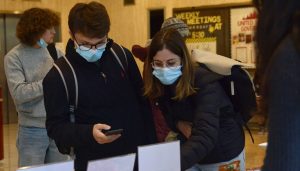
Nicole Varela, a first-year FCLC student, was one of the students who signed up to join the group. Her parents both attended college in El Salvador but never finished. She benefitted from the fact that her older brother went through the process two years before her.
“SATs, ACTs, college essays—I feel like people who know a lot more about that have an advantage, but we talked to people who knew the process, and they helped my brother through it.
“In this group, there are going to be a lot of different people with different experiences, but we all have one thing in common, so that’s nice.”
Students weren’t the only ones the group attracted.
Elizabeth Stone, Ph.D., professor of English, joined because, she said, it’s important to provide a model for what’s possible for students, particularly those who, like her, were both the first to attend college and the first to become a professor.
“I think it’s important for people who may be interested in going into academia to realize there are people who came from the backgrounds that they came from who walked that road, and they can walk it too if they want to.”
First Gen is welcoming members of the Fordham community who are both first-generation students and those who want to support them. For more information, visit here or email [email protected].
]]>
First-year students from Fordham College at Rose Hill and Fordham College at Lincoln Center read The Hate U Give by Angie Thomas, who is the 2021 Mary Higgins Clark Chair at Fordham. The novel tells the story of a Black teenage girl trying to navigate the divide between her poor neighborhood and the fancy prep school she attends. When her unarmed friend is killed at the hands of the police, she is thrust into the spotlight.
“[Thomas’] text invites students to discuss the role of youth activism, belonging, race and many other relevant topics,” said Christie-Belle Garcia, assistant dean for student support and success at Rose Hill.
Jary Jerome Tolentino, an incoming first-year student at Fordham College at Rose Hill, said that the book provided an honest look at the challenges Black people and other people of color face.
“The Hate U Give encapsulated the reality the Black community faces—it didn’t sugarcoat it,” said Tolentino, who plans to study math and computer science. “It showed a lot of racial injustices and even microaggressions, stories of the Black community, and it could even be applied to the people of color for that matter.”
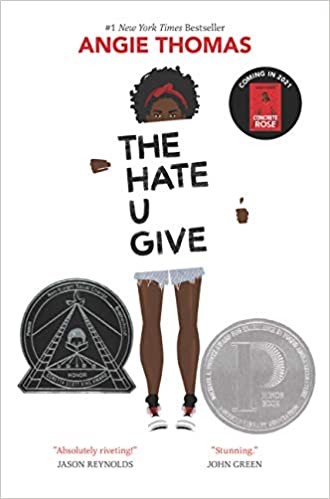
This is the second year of the joint program, which aims to welcome students to the University and help them get to know students from both campuses, said Garcia and Tracyann Williams, the assistant dean for student support and success at Lincoln Center.
Olivia Reyes, an incoming first-year student at Fordham College at Lincoln Center who is planning to major in journalism, said that she was really captivated by how the main character Starr unintentionally became the center of a movement.
“She was simply trying to drive with her friend when she witnessed the most disturbing thing a human can—the murder of a loved one,” Reyes said, noting that Starr became the focus of news stories and a criminal trial. “She underestimates the power of her own voice … until she is able to grow into her new role and see that people will listen to her if she has the courage to speak out and share her own truth.”
Reyes said that the book, along with the events of 2020, inspired her to find her own voice and speak out against injustice.
“[Starr’s boyfriend] becomes actively anti-racist when he speaks out, when he fights side-by side with Starr and shows action. That’s something I think a lot of white people can relate to, including me—trying to find my place in the greater movement and recognizing my silence is complicity,” Reyes said.
Tolentino said that the character of Hailey Grant stuck with him, as she starts out by being one of Starr’s closest friends, but their relationship dissolves after Hailey commits multiple microaggressions and racist acts against Starr.
“Something that really stuck with me was how we all have a Hailey that manifests in our lives one way or another,” he said. “You don’t have to be explicitly racist to be considered racist, even with the small actions that we do, we have to be really mindful of them, and we have to reflect on how they could impact other people.”
Going Beyond the Book
After reading the book, the students had the opportunity to participate in three Zoom sessions, which explored different aspects of the book.
“Engaging with the text is an intimate experience,” said Williams. “Through literature, the intellectual and interpersonal conversation can begin well before the first day of classes for our students.”
Mark Naison, Ph.D., professor of history and African and African American Studies led the first session, which discussed the role of hip hop and political activism. The second session featured Lisa Gill, Ph.D., senior dean for Fordham College at Rose Hill and Renaldo Alba, Ph.D., associate director of CSTEP/STEP exploring how students connected with the themes in the book.
“The most powerful takeaway was from one student who shared that they had never been a part of a discussion like the one we had, and they were excited about coming to Fordham for that exact reason,” Garcia said. “This sentiment really captures one of the main reasons I love the read—students are excited about college and a liberal arts education can provide that space for creativity.”
Confronting Identity Conflicts
Juan Carlos Matos, assistant vice president for student affairs for diversity and inclusion. and Jenifer Campbell, Ed.D., dean of students at Lincoln Center, led the final discussion, where students explored how they related to different characters and themes.
Matos talked about how he struggled for a while with his own identity as a gay Afro-Dominican male.
“I, for a long time, never felt complete—I never felt authentic in either space, so when I was in a group of LGBTQ-identified students, I was one of very few people of color,” he said, adding that the converse was also true: In groups for students of color, he was often one of the few out LGBTQ students.
Tiziana Capizzi, a transfer student attending Lincoln Center in the fall, said she related to Starr and Matos, as a person of mixed heritage—Panamanian and Italian.
“Growing up in Panama, I asked myself, “I’m Latinx enough?” “[Am I] really European at all?” she said. “At the end of the day, just like Starr, I learned that it’s all about remaining open and understanding that both worlds play roles in what makes me unique.”
Engaging with Others
Elliott Lehman, an incoming first-year student at Fordham College at Lincoln Center, said that the discussion made him excited to attend Fordham and continue having deeper, engaging conversations around important issues like racial justice and grassroots community organizing.
“I truly had no idea what to expect from my first academic introduction to Fordham, and I was really rather blown away by not only the [staff members]but the other students,” he said. “Back in high school, a lot of the discussions were very predictable in the sense that, I think, they all just tended to miss the bigger picture.”
Administrators said that they were impressed the students were so willing to share their personal experiences and stories with the group throughout the three sessions.
“It is so powerful to see students connect with the text, each other, and faculty, administrators, and staff participating in the read,” Garcia said. “We want to encourage students to come up to the Bronx or head down to Lincoln Center and to really embrace the “New York City” is my campus motto.”
]]>From Oct. 1 to 4, hundreds of alumni, family, and friends—from as far as Germany—tuned in for an expanded series of virtual events that drew on some of the best-loved Homecoming traditions, like the 5K Ram Run and tailgate parties, and included a “pub” trivia competition, updates on academic and student life amid COVID-19, and a tribute to the 50th anniversary of a Fordham football milestone.
In addition to joining panels and discussions sponsored by the Office of Alumni Relations, Fordham graduates took to social media, where thousands viewed Homecoming Instagram stories and tweets shared via the @fordhamalumni accounts, and others used the #FordhamHomecoming20 hashtag to post their own messages, including pictures of pets and kids decked out in Fordham gear.
A Forum for FCLC
Things kicked off on Thursday evening with a panel discussion featuring two relative newcomers to the Fordham College at Lincoln Center community: Laura Auricchio, Ph.D., who became dean of the college in August 2019, and Tracyann Williams, Ph.D., who joined FCLC as assistant dean for student support and success last February.
Fordham University Alumni Association Advisory Board member Samara Finn Holland, FCLC ’03, moderated the discussion, during which the deans shared their observations about FCLC students.
“They are an amazing bunch of people,” Auricchio said. “These are students who are not only intelligent and motivated, but they’re really just decent, kind, wonderful human beings.” She recalled several instances of students greeting her when they saw her around the city.
Auricchio noted that political science, economics, and psychology are the three most popular majors among current FCLC students, and the fashion studies minor is growing particularly quickly. She said her office is focused on four areas: connecting to neighbors, enriching courses, enhancing research, and globalizing the curriculum.
Both she and Williams addressed the unique challenges faculty and students face during the pandemic, and Williams noted that part of her job is to help students acknowledge their feelings of disappointment that it’s not a typical academic year, and doing what she can to assist them.
“I am very much interested in always asking students what their needs are and not deciding for them,” she said.
Having worked at other New York City universities before arriving at FCLC, both Auricchio and Williams shared what they think makes Fordham so special.
“I feel as though it’s a unique place where students can come be part of a deeply caring, close-knit community that will support them and help them as they branch out into the city,” Auricchio said. “And to me, it’s just the best of both worlds.”
Pub Trivia at Home
Alumnus Tim Tubridy, FCRH ’99, and his brother, James Tubridy, co-owners of DJs @ Work, hosted a virtual pub trivia session on Friday night. Attendees were invited to answer 10 Fordham-themed questions, either individually or as teams.
The first question of the night delved into a bit of the University’s architectural history: “For what church were the stained-glass windows in the University church intended?” Father McShane delivered both the question and answer (St. Patrick’s Cathedral, when it was located on Mulberry Street), joking that he’d been imagining Jeopardy! theme music playing as he gave contestants time to respond.
Other fun facts unearthed during the Q&A included how many books are housed in the Fordham libraries (more than 2 million), how many acres the Lincoln Center and Rose Hill campuses encompass (8 and 85, respectively), and how many live ram mascots have lived on campus (28).
At the end of the hour-long session, three teams were tied for first place with a whopping 20,000 points each.
A Virtual 5K Ram Run
While the 5K Ram Run is usually held at Rose Hill during Homecoming weekend, this year, alumni were invited to run, jog, or walk a five-kilometer trek of their own and to share photos on social media. Runners were also encouraged to share their finishing times by taking screenshots of their running apps, and the Office of Alumni Relations will be sending prizes to those who submitted their times.
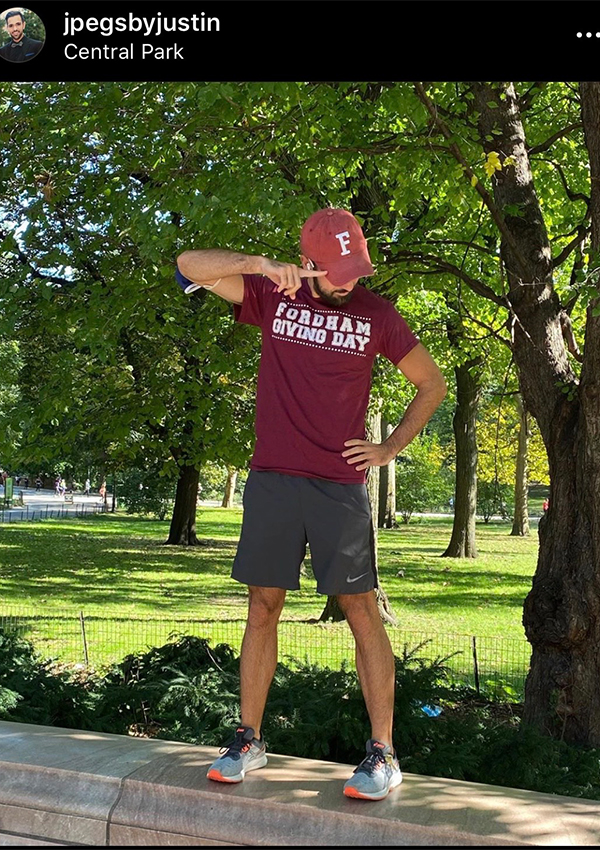
Justin LaCoursiere, FCRH ’12, posted a photo from Central Park and said, “Fordham Homecoming looks a little different this year, but I’m still taking part in some fun [virtual]activities, like the Annual 5K Ram Run.”
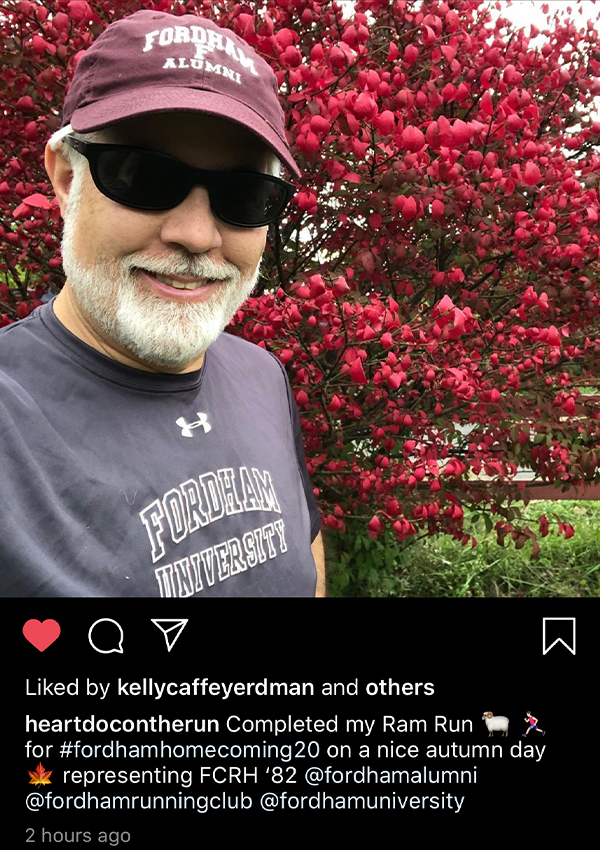
Academic and Student Life Amid the Pandemic
On Saturday morning, a panel of Fordham administrators and faculty discussed the continued uncertainty of COVID-19, its impact on current and prospective Fordham students, and how they’re working to build and strengthen a sense of community under the circumstances. The conversation was moderated by Michael Griffin, associate vice president for alumni relations.
J. Patrick Hornbeck, professor of theology, secretary of the Faculty Senate, and special faculty advisor to the provost for strategic planning, said that soon after Fordham canceled in-person classes and shifted to a virtual format this past March, faculty began planning to avoid such abrupt disruptions for the fall semester. That’s how Fordham developed its flexible hybrid model, which mixes online and in-person learning.
“We would provide opportunities for students to learn and for faculty to teach in several different modalities,” he said. “The idea was, we did not know how things were going to go week-by-week and month-by-month. How could we deliver [a Fordham education]regardless of the way the pandemic would play out?”
During the panel, Patricia Peek, Ph.D., dean of undergraduate admission, said that some of the changes implemented this year, such as virtual guided tours and information sessions, could become permanent to help make Fordham more accessible in the long term.
“I think, even when we’re fully on the ground, we will now always have virtual events because they’re providing so many opportunities and access for students,” she said.
Clint Ramos, head of design and production for Fordham Theatre, noted that the shift “was especially challenging for theatre because our education … is really experiential and a lot of our pedagogy is founded on the ability to gather.” But he said the program has met these challenges head-on, pointing to opportunities for creativity, like a collaborative effort he initiated with theater programs at Princeton, Georgetown, SUNY Purchase, and UMass Amherst. The One Flea Spare Project allows students to virtually attend classes at other universities and collaborate with each other on projects on multiple platforms based on themes in One Flea Spare, a 1995 play by Naomi Wallace set in a plague-ravaged London during the 17th century.
Juan Carlos Matos, assistant vice president for student affairs for diversity and inclusion, spoke about creative ways in which students have tried to maintain a sense of community, whether or not they’re studying on campus. This has included hosting socially distanced outdoor events, such as a “silent disco” on the plaza at Lincoln Center or a musical performance from the Coffey Field bleachers at Rose Hill, for an online audience and a limited number of students in person.
He also said that the pandemic has sharpened students’ focus on social justice, in particular the calls for racial equality that were revitalized this summer.
“Energy that usually is exhausted on other things was nailed into Black Lives Matter in a way where folks who have privilege are just realizing, ‘Hey, these things are happening,’ whereas folks on the margins have always experienced these things.”
Matos said this has spurred action at the University, including an anti-racism plan from Joseph M. McShane, S.J., president of Fordham. And he said the offices of student and multicultural affairs are continuing to offer a variety of programming to keep students engaged. One of the benefits of having virtual or hybrid events is that more students can attend.
“Sometimes it’s difficult for someone to have to choose one campus or the other or we may be offering something on one campus and not the other,” he said. “But virtually, now people can attend in any capacity.”
Shakespeare and Pop Culture
Shakespearean scholar Mary Bly, Ph.D., chair of Fordham’s English department, led a mini-class titled “Pop Romeo & Juliet” on Saturday afternoon. Attendees were encouraged to watch Baz Luhrmann’s 1996 film, Romeo + Juliet, prior to the class, during which Bly delved into the afterlife of the teen duo and their famous star-crossed love.
“Sociologists have made a pretty reasonable case for the argument that Romeo and Juliet actually changed the way we think about love in the Western world, which is very interesting,” Bly said.
Joined by English professor Shoshana Enelow, Bly discussed the idea of cultural capital, looking at how the characters of Romeo and Juliet have survived and how they’ve been transformed in modern adaptations, other films, music, and advertisements. She and Enelow drew parallels to West Side Story, the Beatles, and even a Taylor Swift music video, inviting attendees to write in impressions and examples of their own using Zoom’s Q&A feature.
An Afternoon with Athletics
Fordham sports fans attended two athletics-focused virtual events on Saturday afternoon, including a conversation between Ed Kull, interim director of athletics, and Head Football Coach Joe Conlin.
While the football season, along with those of other fall sports, has been pushed back to spring 2021, winter sports like basketball are planning to get started in late November. Kull highlighted some of the work that has been done to facilities during the pandemic, noting that not having students around for games has allowed several projects to be completed earlier than expected. Among the upgrades that players, coaches, and fans will now find are a new floor for the Frank McLaughlin Family Basketball Court in Rose Hill Gym, renovations to the strength and conditioning and team medicine spaces, and new offices for football staff.
As his team prepares to play in the spring, Conlin discussed the changes to workouts and practices they’ve had to adopt in the time of COVID-19, including health monitoring, socially distanced weight training, and wearing masks under their helmets during practice. Although he and his staff are not allowed to recruit high school players in person this year, they have been talking to recruits over Zoom and reviewing videos to assess their strength and athleticism.
“It’s been challenging at times, but it’s also been a lot of fun,” he said of this new way of doing things on and off the field. “We’ll continue to make it work for as long as we have to.”
Kull noted that out of the 44 seniors across spring sports whose final season was interrupted by cancellations last spring, 19 have decided to come back for a fifth year of eligibility.
Later that afternoon, the Tubridy brothers returned to host a virtual tailgate party that featured a welcome from Father McShane, trivia, performances by the Fordham band from the Coffey Field bleachers, and video updates from departments and groups like the Fordham University Alumni Association, the Center for Community Engaged Learning, and the Mimes and Mummers Alumni Association.
Kull and Conlin also returned for a pre-recorded video from the gravesite of Fordham graduate and NFL coaching legend Vince Lombardi, FCRH ’37, an appropriate lead-in to the tailgate’s final portion: a roundtable discussion with nine players from Fordham’s 1970 football team, which defeated Georgetown 50 years ago during that year’s homecoming game, just weeks after Lombardi’s death.
Moderated by WFUV’s Emmanuel Berbari, a Fordham College at Rose Hill senior, the players recalled the dominant ground game displayed by the Rams in their 39-17 win over the Hoyas, led by Eric Dadd’s 235 rushing yards and three touchdowns. Kevin Sherry, GABELLI ’70, who played offensive tackle, noted that Georgetown had beaten Fordham the previous year, and the Rams were looking for revenge.
Perhaps an even greater motivation for the team was the emotional pregame scene, when Lombardi’s widow, Marie, his brother Joseph, and the remaining members of Fordham’s “Seven Blocks of Granite” offensive line from Lombardi’s playing days honored the Fordham and NFL legend, who had died of colon cancer on September 3. The 1970 season also marked the return of varsity football to Fordham.
Peter “Pino” Carlesimo, FCRH ’71, the team’s starting quarterback, was among the panelists. “I think the importance of the game can be summed up very easily when I when I looked at that film and I saw my uncle Pete [Carlesimo, FCRH ’40, Fordham’s athletic director at the time] escorting Mrs. Lombardi off the field and tears coming down her eyes,” he said. “It was probably the biggest game I played in my career.”
Closing with Centeredness and Prayer
On Sunday morning, Carol Gibney, associate director of campus ministry for spiritual and pastoral ministries and director of spiritual life, leadership, and service, led a session focusing on “integrating Ignatian spirituality with the practice of yoga.” During the 45-minute practice, Gibney used breathwork to break down the word “grace,” infusing the ideas of gratitude, reflection, affirmation, centeredness, and enthusiasm and excitement into the yoga flow.
The virtual—but still communal—Homecoming weekend came to a close with a livestream of Mass from University Church, concelebrated by Father McShane and Damian O’Connell, S.J., alumni chaplain.
—Additional reporting by Kelly Kultys and Sierra McCleary-Harris
]]>“There’s a shared collective experience that they’ve had of having lost a lot this spring. They experienced high school endings that are very different than what they probably imagined. And whether or not they are directly impacted by issues of racism or police brutality, they have been witnessing them,” said Tracyann Williams, Ph.D., assistant dean for student support and success at the Lincoln Center campus. “One way to deal with trauma is to come together in meaningful ways, and I believe that literature has the power to bring people together.”
This year, the incoming class is reading The Colossus of New York by Colson Whitehead, the first fiction writer to win the Pulitzer Prize for back-to-back novels. In the third week of July, first-year students received free electronic copies of the book. Over the next few weeks, students will be able to join four hour-long, open-ended discussions about the book with juniors and seniors, faculty, staff, and alumni from both campuses over Zoom; opting in to as many as they like. The first session will be held on July 29, followed by three more in August.
Whitehead’s 2004 book explores the many ways people experience New York City, from the moment of their arrival to the classic morning commute.
“Navigating a chapter is a bit like walking through six blocks of Midtown at lunchtime: everything conspires to slow you down, but you will have taken in more sensations than you could reasonably expect from such a distance anywhere else,” read a book review from The New York Times. The Colossus of New York also gives readers a chance to dream, said Williams.
“It really tried to articulate the feeling of loss, uncertainty, renewal, beauty, love for the city, and sadness, and have a collective experience,” Williams said. “It’s presented in a bunch of vignettes that you can dip into and dip out of, but it also allows you the opportunity to dream yourself.”
The summer reading tradition started at the Lincoln Center campus is not new. In 2018, first-year students at Fordham College at Lincoln Center read The Magicians by Lev Grossman, a novel that inspired a television series on the SyFy network and explored the practice of “magic” in the real world. The following year, first-year students read a collection of essays by New York Times and T Magazine columnist Ligaya Mishan.
While reading The Colossus of New York, students should consider the classic Fordham phrase “New York is my campus, Fordham is my school” and think about the lived experiences that belong to them and their peers, said Christie-Belle Garcia, Ph.D., assistant dean for student support and success at the Lincoln Center campus.
“I grew up in New York, but if you ask me, I’m looking for the 1 train. What happens if you get above 168th?” said Garcia, who grew up in the Bronx. “It’s different for all of our students who are coming with different dreams and aspirations.”
This year, Garcia and Williams are spearheading the summer engagement program, which has two websites for Fordham College at Rose Hill and Fordham College at Lincoln Center students.
“We want to sit and chat about our human experience—our lived experience,” said Garcia.
Perhaps more importantly, they want to introduce incoming students to a network of Fordham individuals who will be there for them when they arrive, and facilitate conversations where they can share their concerns and stories, said Garcia.
She said students have talked about COVID-19 and the Black Lives Matter movement, as well as the experiences of Black and other Fordham students of color that have been published on social media, and the reality is that there’s been a rupture in the community.
“We can’t pretend our incoming freshmen aren’t reading about it, right?” said Garcia. “Fordham is not perfect. It has a long way to go. But there are people at Fordham who want to be a part of working to make our experience there together better.”
This fall, undergraduate classes will begin on August 26 in a flexible hybrid learning environment. But if the pandemic resurges in New York and students are no longer able to study on campus, said Williams, the city will await their return.
“New York is still here. We’re all here,” she said. “The New York they were hoping for, the New York that was going to remake them … It’s still going to be here, waiting for them.”
]]>